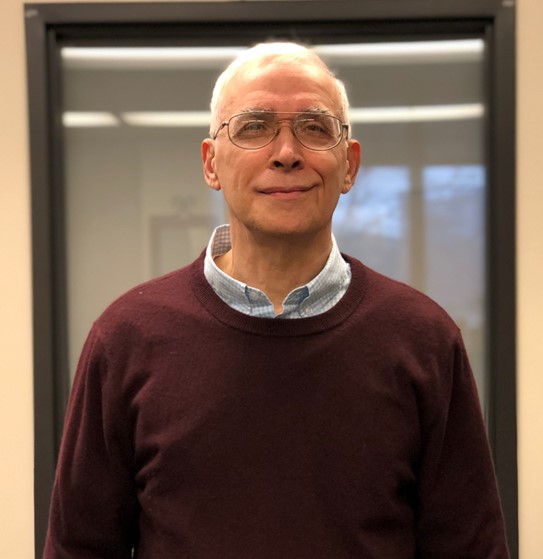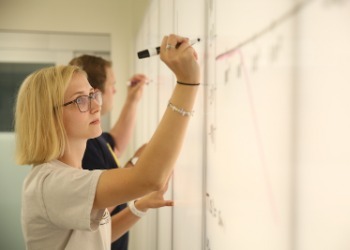BRIDGING ENGINEERING AND PHILOSOPHY FOR SOCIAL IMPACT
 Marquette University offers a new course, CORE 1929: Methods of Inquiry, Socially Conscious Design, resulting from collaboration between the Electrical and Computer Engineering (ECE) and Philosophy departments. The Marquette Core Curriculum seeks to provide students with a structured experience that will allow them to refine their own worldview and prepare them to address the world’s problems. To understand and address any of the challenges that we face in an increasingly complex world requires the ability to engage with multiple perspectives. Co-designed and co-taught by Professor Edwin Yaz from ECE and Dr. Peter Burgess from Philosophy, this course is about taking an interdisciplinary approach to solving problems. It is a broad-ranging course in moral theory and practice, open to all disciplines and all majors. When the course was first offered in Fall 2023, 150 students from various majors, including engineering, nursing, business, political science and others enrolled in the course.
Marquette University offers a new course, CORE 1929: Methods of Inquiry, Socially Conscious Design, resulting from collaboration between the Electrical and Computer Engineering (ECE) and Philosophy departments. The Marquette Core Curriculum seeks to provide students with a structured experience that will allow them to refine their own worldview and prepare them to address the world’s problems. To understand and address any of the challenges that we face in an increasingly complex world requires the ability to engage with multiple perspectives. Co-designed and co-taught by Professor Edwin Yaz from ECE and Dr. Peter Burgess from Philosophy, this course is about taking an interdisciplinary approach to solving problems. It is a broad-ranging course in moral theory and practice, open to all disciplines and all majors. When the course was first offered in Fall 2023, 150 students from various majors, including engineering, nursing, business, political science and others enrolled in the course.
The theme for this course is socially conscious design, which supposes that engineering solutions have social consequences, often unintended, that require more thought than simply solving a technical problem. The two approaches for this class, engineering and philosophy, complement each other in the sense that former speaks to the practical challenges and opportunities of solving problems, and the latter speaks to the theoretical and moral implications of possible solutions. In this course, these approaches are embedded in the Ignatian educational paradigm and aim to reconcile the mind and the heart aspects.
Practical skills, which when practiced lead to professional and personal success in life, are introduced. Topics include professionalism, vocation, creativity, problem solving, discernment, stress management, stewardship, ethics and morality, and conflict management. Other areas of focus are risk taking, emerging ethical issues in predictive policing, the use of artificial intelligence (AI), and nanotechnology. Several case studies demonstrate that breaches of ethics are not only morally wrong but may also result in significant business losses. The focus is on how different disciplines approach issues and provide answers to difficult problems. What does one viewpoint allow us to see that another does not for a particular issue? How do they work together to give us a more complete understanding of the issues at hand and look for answers?
Dr. Edwin Yaz has been a professor of the Department of Electrical and Computer Engineering at Marquette since 2001. He has extensive experience and expertise in stochastic and nonlinear systems modeling, analysis, estimation, and control with recent applications to smart microsystems, electric energy systems, resilience of cyber-physical systems and unbiased surveillance. Beyond his research, Dr. Yaz is dedicated to improving learning and addressing gender issues in STEM education. He is the innovator behind CORE 1929, bringing a wealth of knowledge and insight to this interdisciplinary course. He described his experience in Fall 2023 as "we had a nice learning community, where I learned at least as much from Dr. Burgess and our students as I hope they learned from me.”
The ECE department chair, Dr. Majeed Hayat, said, "I'm very happy and proud that our department has taken the lead in underscoring the important role of ethics in engineering through CORE 1929. This course prepares our students not just as future engineers but as conscientious global citizens who can address complex problems with both skill and sensitivity. It's a testament to our faculty's dedication to advancing knowledge and applying it for the greater societal good."

 Marquette University offers a new course, CORE 1929: Methods of Inquiry, Socially Conscious Design, resulting from collaboration between the Electrical and Computer Engineering (ECE) and Philosophy departments. The Marquette Core Curriculum seeks to provide students with a structured experience that will allow them to refine their own worldview and prepare them to address the world’s problems. To understand and address any of the challenges that we face in an increasingly complex world requires the ability to engage with multiple perspectives. Co-designed and co-taught by Professor Edwin Yaz from ECE and Dr. Peter Burgess from Philosophy, this course is about taking an interdisciplinary approach to solving problems. It is a broad-ranging course in moral theory and practice, open to all disciplines and all majors. When the course was first offered in Fall 2023, 150 students from various majors, including engineering, nursing, business, political science and others enrolled in the course.
Marquette University offers a new course, CORE 1929: Methods of Inquiry, Socially Conscious Design, resulting from collaboration between the Electrical and Computer Engineering (ECE) and Philosophy departments. The Marquette Core Curriculum seeks to provide students with a structured experience that will allow them to refine their own worldview and prepare them to address the world’s problems. To understand and address any of the challenges that we face in an increasingly complex world requires the ability to engage with multiple perspectives. Co-designed and co-taught by Professor Edwin Yaz from ECE and Dr. Peter Burgess from Philosophy, this course is about taking an interdisciplinary approach to solving problems. It is a broad-ranging course in moral theory and practice, open to all disciplines and all majors. When the course was first offered in Fall 2023, 150 students from various majors, including engineering, nursing, business, political science and others enrolled in the course.